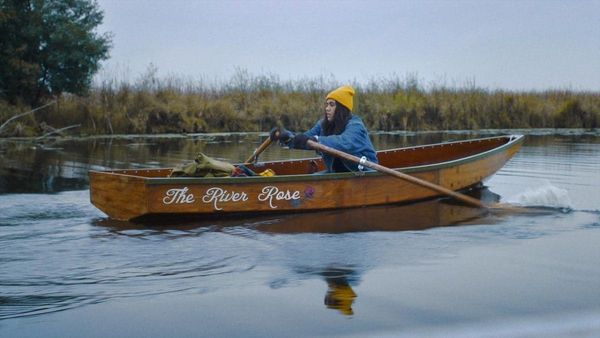Eye For Film >> Movies >> Once Upon A River (2019) Film Review
Once Upon A River
Reviewed by: Amber Wilkinson

Margo (Kenadi DelaCerna, making an impressive debut) is a Native American teenager living up river somewhere in Michigan in 1977 and who, after a tragic incident, is about to undertake an American odyssey in an indie key. Although first-time feature director Haroula Rose lays on the narration thickly to begin with, when stitching Margo's back story more carefully through the film would have been less clunky, she has a strong grasp of visual storytelling - from the lush riverside landscapes where Margo goes hunting to the honeyed glow cinematographer Charlotte Hornsby gives to much of the action.
Living with her single dad (Tatanka Means), after her mother apparently abandoned them, in the middle of what seems to be a predominantly white community, Margo's ability with a gun has garnered the jealousy of her cousin Billy (Sam Straley) and the attention - not necessarily savoury - of her uncle Cal (Coburn Goss) leading to an early pivotal incident that sees her flee in search of her mum.

We follow her on the river trip as she encounters a collection of people along the way, although some of these encounters feel considerably more natural than others. The action has the gentle emotional sweep that mirrors the river of its title, even if it is increasingly weighed down by overplotting that sidelines its central character's development. Rose, adapting from Bonnie Jo Campbell's book of the same name, does a good job of creating lived-in characters and the casting is spot on, with each actor bringing heart and soul to even the smallest of role - Straley does more with a sentence of resignation and regret than many actors do with pages of script, while Dominic Bogart also brings a real presence to his small role while Goss has just the right combination of warmth and threat.
But though each character fits well with the landscape, Rose's desire to constantly shovel on plot development - a moment of romance, a friendship with a dying man (John Ashton, with another small but well worked performance) - means there's not much room for Margo herself to develop. She has a range of experiences, one or two good but mostly bad, but she begins to feel like a punchbag for them to bounce off rather than a real person who is being shaped by lived experience, where other recent films with similar aged protagonists, like Leave No Trace and Never Rarely Sometimes Always have felt more organic in development. That sense of being 'told' things rather than shown them that was hinted at by the original voiceover never quite leaves as Margo talks of surface matters, such as the way that her mother smelled of cocoa butter and white wine, without ever going further into psychological territory. Even when she meets her mother (Lindsay Pulsipher), the scripting feels perfunctory, as though Rose is unwilling to dive in too deep. There is plenty of potential here but it's a shame we spend so much time simply following the surface trajectory of Margo's life rather than diving into its emotional depths.
Reviewed on: 07 May 2021

















